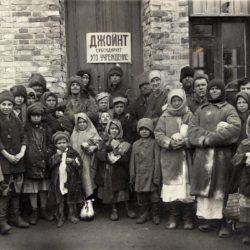Contributor(s): Shared on: Categories: Tags: | Source (Hebrew) | Translation (English) |
|---|
מִזְמ֗וֹר לְדָ֫וִ֥ד
|
David’s song: |
יְ֭הֹוָה
מִי־יָג֣וּר בְּאָהֳלֶ֑ךָ
מִֽי־יִ֝שְׁכֹּ֗ן
בְּהַ֣ר קָדְשֶֽׁךָ׃
|
Yah!
Who may be at home in Your tent?
Who may find sanctuary
On Your Sacred mountain? |
הוֹלֵ֣ךְ תָּ֭מִים
וּפֹעֵ֥ל צֶ֑דֶק
וְדֹבֵ֥ר אֱ֝מֶ֗ת
בִּלְבָבֽוֹ׃
לֹֽא־רָגַ֨ל ׀ עַל־לְשֹׁנ֗וֹ
לֹא־עָשָׂ֣ה לְרֵעֵ֣הוּ רָעָ֑ה
וְ֝חֶרְפָּ֗ה לֹא־נָשָׂ֥א עַל־קְרֹֽבוֹ׃
נִבְזֶ֤ה ׀ בְּֽעֵ֘ינָ֤יו נִמְאָ֗ס
|
One who strides with wholeness,
Acts with fairness,
Whose heart and words
Speak with honesty,
Not given to gossip,
Not hurting others,
Not shifting blame on others.
Wary of his own motives, |
וְאֶת־יִרְאֵ֣י
יְהוָ֣ה יְכַבֵּ֑ד
נִשְׁבַּ֥ע
לְ֝הָרַ֗ע
וְלֹ֣א יָמִֽר׃
כַּסְפּ֤וֹ ׀ לֹא־נָתַ֣ן בְּנֶשֶׁךְ֮
וְשֹׁ֥חַד עַל־נָקִ֗י
לֹ֥א לָ֫קָ֥ח
עֹֽשֵׂה־אֵ֑לֶּה
לֹ֖א יִמּ֣וֹט לְעוֹלָֽם׃
|
He honors those
Who are respectful of God.
She will not stoop to lie
When she swears,
Even if it causes her loss.
He lends his money, interest free,
Won’t accept a bribe,
To convict the innocent.
One who acts in this way,
Will never waver. |
Psalms 15 is read on special days of festive joy in place of Taḥanun. Rabbi Zalman Schachter-Shalomi, z”l, included his translation of Psalms 15 in his Siddur Tehillat Hashem Yidaber Pi (2009). To the best of my ability, I have set his translation side-by-side with the verses comprising the Psalm. –Aharon N. Varady Source(s)
 Rabbi Dr. Zalman Meshullam Schachter-Shalomi, affectionately known as "Reb Zalman" (28 August 1924 – 3 July 2014) was one of the founders of the Jewish Renewal movement. Born in Żółkiew, Poland (now Ukraine) and raised in Vienna, he was interned in detention camps under the Vichy Regime but managed to flee the Nazi advance, emigrating to the United States in 1941. He was ordained as an Orthodox rabbi in 1947 within the ḤaBaD Hasidic movement while under the leadership of the sixth Lubavitcher Rebbe, Yosef Yitzchok Schneersohn, and served ḤaBaD communities in Massachusetts and Connecticut. He subsequently earned an M.A. in psychology of religion at Boston University, and a doctorate from the Hebrew Union College. He was initially sent out to speak on college campuses by the Lubavitcher Rebbe, but in the early 1960s, after experimenting with "the sacramental value of lysergic acid", the main ingredient in LSD, leadership within ḤaBaD circles cut ties with him. He continued teaching the Torah of Ḥassidut until the end of his life to creative, free and open-minded Jewish thinkers with humility and kindness and established warm ecumenical ties as well. In September 2009, he became the first contributor of a siddur to the Open Siddur Project database of Jewish liturgy and related work. Reb Zalman supported the Open Siddur Project telling its founder, "this is what I've been looking forward to!" and sharing among many additional works of liturgy, an interview he had with Havurah magazine in the early to mid-1980s detailing his vision of " Database Davenen." The Open Siddur Project is proud to be realizing one of Reb Zalman's long held dreams. The Mesorah (Heb: מָסוֹרָה) a/k/a, the Masoretic text is the authoritative Hebrew and Aramaic text of the TaNaKh for Karaite and Rabbinic Judaism. It was primarily copied, edited and distributed by a group of Jews known as the Masoretes between the 7th and 10th centuries CE. The Masoretic Text defines the Jewish canon and its precise letter-text, with its vocalization and accentuation known as the Masorah. David ben Yishai was the second king of the United Kingdom of Israel and Judah, reigning ca. 1010–970 BCE. While almost half of the Psalms are headed "l'David" and tradition identifies several with specific events in David’s life (e.g., Psalms № 3, 7, 18, 34, 51, 52, 54, 56, 57, 59, 60, 63 and 142), most scholars consider these headings to be late additions and that no psalm can be attributed to David with certainty. 1 Samuel 16:15-18 describes David as a skillful harp (lyre) player and "the sweet psalmist of Israel." Read a comment / Leave a comment (moderated) Works of related interest: |












Leave a Reply